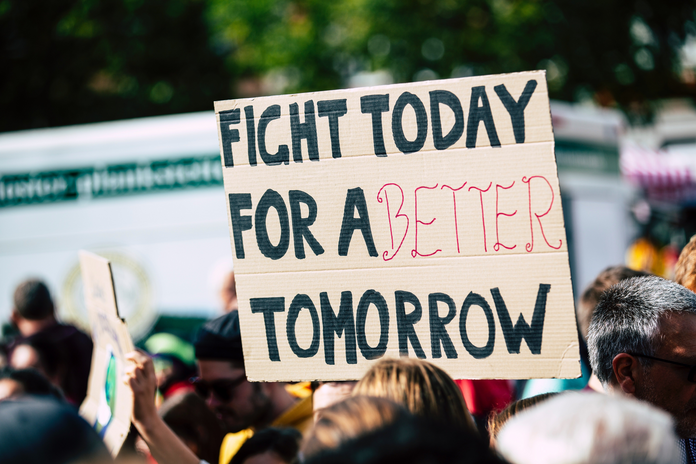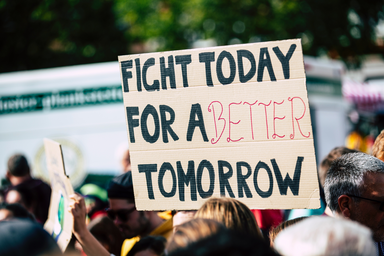Angelica Williams, 33, has been shaped by both sides of Gainesville.
As a student at Gainesville High School, the East side became her home. After graduation, she crossed the divide to the West side as a marketing student at the University of Florida.
Every day, the two bus rides back to East Gainesville was like a magnet pulling her back to reality, she said.
“The East side of town looks like there’s no hope and despair if you’re driving from the University of Florida,” she said. “It looks like the neighborhood goes down, and you feel this doom and gloom type of feeling.”
Williams said she believes that the East side deserves attention from the city that it has yet to receive — especially in the current call for a moratorium on large development.
On Thursday, the Gainesville City Commission discussed the ongoing call to halt major development, especially for student living, in historically Black parts of Gainesville but did not reach a consensus. The movement for a moratorium gained traction in July with the announcement that luxury student housing would be built on the land that was formerly Seminary Lane, an affordable housing complex in Pleasant Street.
Pleasant Street Historic District is one of the areas under consideration for the moratorium, according to a petition shared on Facebook addressed to Mayor Lauren Poe and the city commission. The other areas falling victim to overdevelopment and gentrification include the Porters community, Fifth Avenue and Springhill.
Williams said she believes the city commission sometimes prioritizes the needs of the university over the wellbeing of Eastside citizens.
“I feel like the East side of town doesn’t get the attention it deserves,” she said. “There is plenty of talent and entrepreneurs that are on the East side of town that financially don’t receive the same quality as somebody that was on the West side of town.”
The moratorium on development would help lessen the levels of inequity between East and West Gainesville and white and minority residents, Williams said.
The East side of Gainesville houses a high concentration of low-income and minority residents, according to the 2018 UF Bureau of Economic and Business Research report on inequity in Alachua County. In Alachua County, 35.7 percent of African American households live below the poverty line.
She added that if the moratorium is approved, time needs to be dedicated to establishing much-needed services in East Gainesville. The proposed time-sensitive halt to development would allow for such businesses, including health care facilities and grocery stores.
The only major chain store to buy produce on the East side is a Walmart, Williams said. The area is also lacking in child care.
While the Reichert House provides educational services for some children in the area, others are left struggling, she said.
“There’s not a lot of activity for kids to get into,” she said. “So you find kids getting in more trouble because there’s nothing geared toward them.”
At Eastside High School, 58 percent of students are economically disadvantaged, according to 2018 US News & World Report data. The school also has seen an above-average amount of out-of-school suspensions in past years, but the number is slowly improving.
Williams said she hopes with increased child care services, these students may have more guidance to make better decisions and avoid disciplinary action.
Some parents Williams has met have been working two to three jobs to keep up with the increasing prices of living in these areas due to heightened development, she said.
Williams said as Gainesville has risen to a top 10 college town, historically Black parts of Gainesville continue to be ignored — or worse, destroyed. She recommended that the city commission should take time to go into the East side to build relationships with the families struggling to get by before they make decisions that could potentially displace them.
“I feel like if this moratorium goes through and the East side of Gainesville gets what it needs and what it rightfully deserves, I feel like it’ll be a change, not only in our crime rates or in the way that our people move — it’ll be hope on that side of town,” she said.
Tyra Edwards, a 50-year-old activist nicknamed “Ty Loudd,” has fought for equitable treatment on the East side for the past seven years, she said. Before the gentrification of Porter’s Street became unbearable and before masked protestors marched against the development of Seminary Lane this summer, Edwards said she predicted what was to come.
“I started noticing, ‘hey, we don’t have anywhere to live; we’re not going to have anywhere to live,’” she said. “There’s no affordable housing; everything that’s being built is not for us.”
Edwards hopes that with the support of City Commissioner Gail Johnson, the moratorium may be a possibility. While the commission did not settle on a decision regarding development at the Oct. 15 meeting, Johnson has been persistent in her demand for equitable housing.
She added that community members have to be active in their support of Commissioner Johnson in meetings, as well.
With a chance to rejuvenate the East side, Edwards said that new equitable development — including grocery stores, health services or a bank — could provide new jobs to help community members pay for the increasing cost of living.
It will also give Eastside residents the opportunity to not have to search for the resources that are easily accessible on the West side, she said.
Edwards believes the city commission knows what is happening but is choosing to focus on revenue from the university instead of permanent residents.
“We live here in Gainesville, too, and we make this city work just like anybody else; we make this city work just like the students make it work,” she said. “And when the students go home and they’re not here, who keeps this city running? Who works at these businesses and works at the hospitals and works everywhere else to keep Gainesville running for the students?”
Edwards said she has spoken to families that are still displaced from Seminary Lane being demolished 11 years ago. She worries that there is more being taken from these areas than houses, however.
“It’s not just about affordable housing,” she said. “It’s about culture, it’s about being social, it’s about seeing people, it’s about us remembering and being in our community.”


